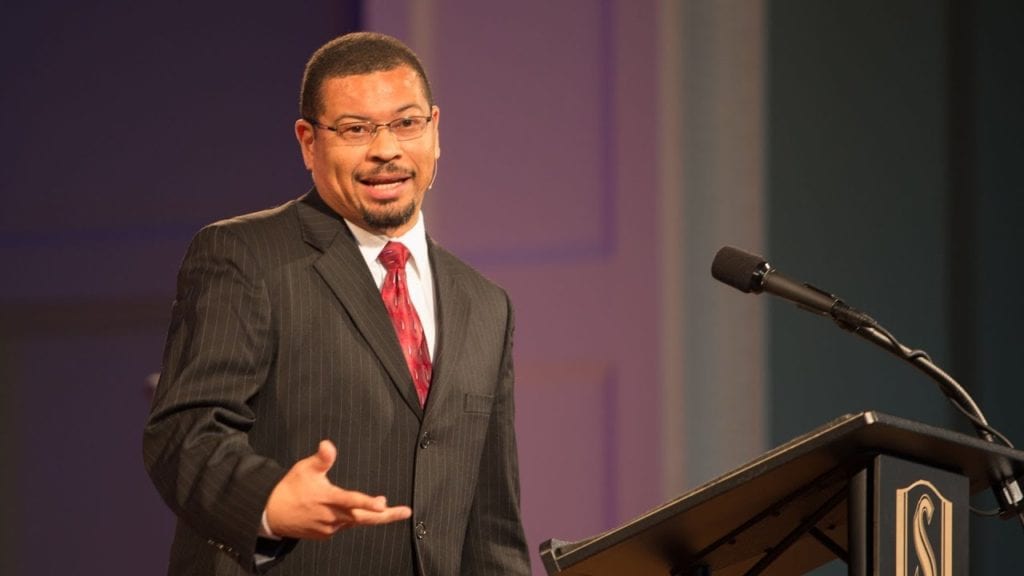“Do we want to be known for our love or only our loyalty to our kind?” Vincent Bacote of Wheaton College asked in a discussion on how to approach divisive political issues in a civil and Christ-like way. His four principles urged churches to reject the idolatry of politics, pursue justice, exhibit humility, and display love to all. Wheaton is one of U.S. Evangelicalism’s most prominent schools.
Bacote visited Trinity International University on Thurs., Sept. 17 to discuss how Christians should approach the pursuit of justice. This talk was hosted by “Koinonia: The Trinity Faith and Politics Initiative.” Bacote is an associate professor of theology and the Director of the Center for Applied Christian Ethics at Wheaton College (IL). He titled his talk, “How Can the Church Cultivate Justice in a Polarized Culture?”
Bacote organized his message around four principles for churches to remind congregations. The first emphasized loyalty to God alone by resisting the temptation of trusting politics to fulfill desires. “The temptation is to hear the voice of the political carnival barkers,” Bacote said. “Idols are great at making promises and horrible at delivering on them… but idols feel nearer than a transcendent God. If you call yourself a Christian, that is out of bounds.”
This idolatry extends to politics. Rather than misplacing trust in all politicians to do the work of God, Bacote says to “Have your loyalty to God alone. This is Obligation Number One if you’re a Christian. If you love God with all you’ve got, there’s no room for anything else.”
The second principle was to remember the responsibility of Christians to pursue justice in a fallen world. He connected this to the overall mandate of Christians to be responsible for God’s creation, and this includes participation in politics to seek the good of all humankind.
“A lot of times, people only think of justice in a selective fashion,” Bacote said, “but God isn’t interested in selective justice. We’re seeking total justice.”
According to Bacote, this includes racial justice, poverty, inequalities, religious freedoms, and more. He said that these issues are all encompassed by the term “social justice” because they deal with human beings as image-bearers of God. He also emphasized that the pursuit of justice is a marathon, not a sprint; so Bacote encouraged churches to keep a long-term perspective by reminding congregations to pursue justice even when it is no longer a popular trend.
“If you’re a Christian, a justice issue for any circumstance is your issue; it doesn’t only have to be on your doorstep” Bacote said. “[The church should] help fellow Christians understand that our faith and commitment to the God of the universe means justice in his universe.”
Bacote’s third principle addressed the sources of barriers to the pursuit of justice, namely personal fear and confusion. Recent events have resulted in heightened emotions, and Bacote says this can cloud discernment. He encouraged Christians to display humility through repentant prayer asking God to “search our hearts and expose our incompetence and fears.” This, Bacote believes, would foster better and more honest communication which seeks to listen and understand.
“If you are scared, uncomfortable, and confused just admit it,” Bacote exhorted. “Let’s do the work of saying, ‘God, help me see what’s really going on with me’… Invite genuine and total self-examination.”
Bacote believes that this self-reflection and humility will foster honest conversations by stripping away the pressure to appear confident and knowledgeable.
“If we had more conversations where we sought what others think, even when they disagree with us, what a community we would be,” Bacote said. “We’d have a society of listening and mutual learning.”
This aspect of mutual learning led to Bacote’s final principle: “Love neighbors without an asterisk.” The only criteria for a Christian to respect someone is the imago Dei; therefore Christians have the opportunity to be known for love of all, even those who vehemently disagree.
“In my weaker moments, I might pray, ‘Lord, won’t you just smite them just a little?’” Bacote said. “But I wish the public reputation of evangelicals is that of a people who seek the good of all. What if that’s what we were known for? Evangelicals: truly good news people – for everybody.”
Bacote connected this mandate with an exhortation to reject toxic Christian tribalism. If evangelicals are to be good news people, this must extend to all. Bacote used the example of evangelicals and those in the LGBTQ community. A “good news evangelical” will strive to be the first person to welcome a young adult who has been kicked out of their home. Bacote said he longed for the public reputation of evangelicals to be known as this type of person: one who loves regardless of differences.
By implementing these four principles of loyalty to God, pursuit of justice, self-examination, and love for all people, Bacote says Christians can more effectively act as witnesses of the gospel and interact with a polarized political culture.






Comment by Gary Bebop on October 8, 2020 at 6:27 pm
Pandering to the talking points of the Left won’t help us. I get the sense that elite evangelical minds are steeped in messaging from the Left. That’s the way our response is shaped; it’s shaped for an audience that doesn’t really care what we think. When are evangelical-orthodox intellectuals going to address the matter of the individual’s conscience? Is there a conscience that’s still active (not hardened, not impervious)? In my own experience (I confess), the “covering narrative” of corporate sin obscured the issue of my own sin. A long delayed reading of Mere Christianity unbolted the cover over my mind and heart. How grateful I am for the reach of that type of conviction.
Comment by David Gingrich on October 11, 2020 at 7:26 am
Interesting fail here. One of our biggest problems in today’s church is that the Left has made “justice” an idol. Bacote seems to be kneeling to that idol while decrying idols.